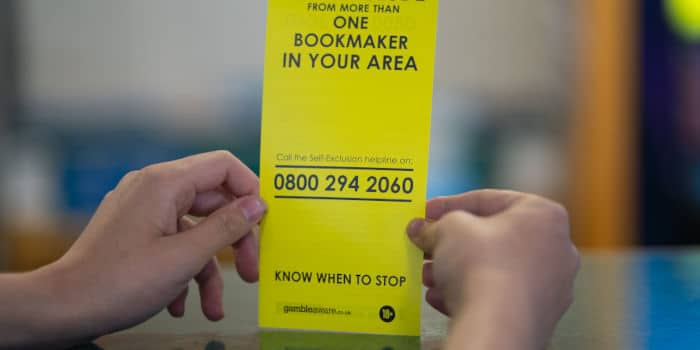- Casino
- By State
- Alabama
- Alaska
- Arizona
- Arkansas
- California
- Colorado
- Connecticut
- Delaware
- Georgia
- Florida
- Hawaii
- Idaho
- Illinois
- Indiana
- Iowa
- Kansas
- Kentucky
- Louisiana
- Maine
- Massachusetts
- Maryland
- Michigan
- Minnesota
- Mississippi
- Missouri
- Montana
- Nebraska
- Nevada
- New Hampshire
- New Jersey
- New Mexico
- New York
- North Carolina
- North Dakota
- Ohio
- Oklahoma
- Oregon
- Pennsylvania
- Rhode Island
- South Carolina
- South Dakota
- Tennessee
- Texas
- Utah
- Vermont
- Virginia
- Washington
- West Virginia
- Wisconsin
- Wyoming
- By State
- Slots
- Poker
- Sports
- Esports
Fact-checked by Stoyan Todorov
Catie Di Stefano: “Personalization in the gambling industry is essential”
As brands strive to stand out and achieve stronger bottom-line results, Smartico explores how personalization can play a key role in creating a robust strategy to drive this success

Catie Di Stefano, Marketing Director at Smartico speaks with GamblingNews discussing how personalization is transforming the gambling industry, driving player loyalty, and setting new standards for engagement and retention.
Q: Why is personalization important in the gambling industry?
Personalization in the gambling industry is not just important, it is essential. With countless operators available, a personalized gaming experience can differentiate a casual player from a loyal customer. Personalization allows operators to make players feel understood and valued, which is increasingly rare in a world of one-size-fits-all experiences. By leveraging data to create tailored interactions—whether through rewards, challenges, or communication styles—operators can build a sense of connection and trust.
Furthermore, personalization helps prevent churn by showing players that their preferences are noticed and prioritized. When executed effectively, it goes beyond marketing, becoming more about crafting an experience that resonates with each player’s motivations and habits. This not only encourages engagement but also lays the foundation for long-term loyalty and brand advocacy. Ultimately, personalization in gambling transforms a transactional experience into a relational one, providing a significant advantage in a competitive industry.
Q: What type of personalization tools have proven to be most popular, and with what player demographics?
At Smartico, we have observed that our gamification tools such as ‘levelling up’, earning badges, and participating in tournaments are particularly popular among younger generations, especially Millennials and Gen-Z. These demographics appreciate the progression and social elements that gamified experiences provide, as they offer additional goals and rewards beyond typical gameplay. This keeps engagement high and encourages players to return more frequently.
Customizing these gamification elements further enhances the brand experience. Incorporating social features, such as player leaderboards and in-game chat, attracts younger audiences who often seek community-driven experiences. Leaderboards, when combined with gamified rewards, foster a sense of community and encourage friendly competition among players, significantly enhancing their loyalty and frequency of play.
We have also observed that personalization based on real-time behavioral triggers, such as re-engagement messages sent after a period of inactivity, has resonated well across various demographics. This strategy allows brands to tailor communication to player behavior, offering reminders or incentives based on their specific activity patterns. This approach is effective in reducing churn and extending player retention. We’ve noticed that older demographics, such as Gen X and Boomers, appreciate these reminders to re-engage, as they find them helpful without being intrusive.
Q: To what extent can personalization features help drive retention and player lifetime value (LTV)?
When players feel personally rewarded, it fosters a sense of loyalty. For example, offering tailored bonuses based on player behavior, such as extra spins on their favorite slot game, demonstrates that the operator understands and values them as individuals.
This recognition creates a loyalty loop, where players are more likely to return, make deposits, and stay engaged, ultimately increasing their LTV. In any industry, personalized experiences help players feel a stronger connection to the brand because they feel seen and understood.
When players consistently encounter games they love, receive meaningful rewards, and participate in challenges suited to their skill levels, they’re more inclined to return to the operator to continue their achievements and grow emotionally invested in the brand. Additionally, gamification features that reward accomplishments, leaderboards that promote friendly competition, and customised communication channels enhance the experience, making it more enjoyable and memorable.
Q: What can we expect to see in this field in the near future as AI and other tech evolves?
There are numerous opportunities for AI and personalization in gaming. With faster data processing capabilities, we are likely to see real-time personalization. For instance, if a player’s mood or play style changes during a session, the platform could adjust immediately by modifying the game difficulty, presenting special bonuses, or offering calming options to encourage healthier gameplay. This level of responsiveness could help operators enhance positive, sustained engagement and prevent churn by addressing players’ needs instantly.
As virtual reality (VR) and augmented reality (AR) gain popularity, we might also witness immersive and highly personalised gaming experiences. Imagine a VR casino where AI customises everything from the visual environment to the types of interactions and challenges a player encounters, all based on their individual preferences and behaviors. This level of immersion could redefine player loyalty and engagement, as VR and AR allow for a new level of customisation and connection.
AI-driven behavioral analysis could elevate player segmentation in the future by developing sophisticated ‘personas’ based on intricate data such as in-game actions, play duration, and spending habits. This capability could see operators automatically tailor campaigns and gameplay elements to match individual player profiles. Instead of general segments, AI can create highly nuanced profiles that facilitate targeted personalization, thereby increasing engagement and loyalty across diverse player types.
Angel has a passion for all forms of writing, be it fiction or nonfiction. His curious nature gives him an ace up his sleeve when researching a new topic. Angel’s thirst for knowledge, paired with adaptability, always helps him find his way around.
Previous Article

Insider
November 11, 2024
DraftKings Considers Political Betting in the Wake of the Election

Next Article


Insider
November 11, 2024
Cherokee Nation Strikes Back as Voters Challenge Its Arkansas Casino
Must Read
Insider
May 15, 2025
Joshua Gamble: “Cross-sell is dead. What next?”
More Articles





Industry
July 15, 2025
UK Considers Gambling Tax Hike to Fill Budget Gap

Casino
July 15, 2025
Uno Is Coming for Casinos in the United States

Industry
July 14, 2025
GambleAware Launches Milestone Self-Awareness App

Casino
July 14, 2025
Number of Canadian Travelers to the US Slumps Again











